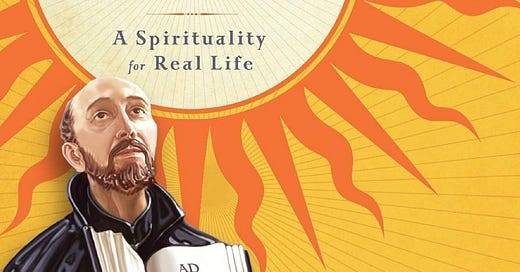Some months ago, I picked up James Martin’s book “The Jesuit Guide to Almost Everything.” I’m pretty bad about getting outside my own tradition in my readings, and I found this book to be really charming and in some places very practically helpful.
One of my favorite sections of the book is the chapter on Desire and the Spiritual Life, or what C.S. Lewis called the Sensucht of existence: the earnest yearning for communion with the world. In a delightful story, Martin shares his own experience in feeling Sensucht:
When I was young, I used to ride my bike to school in the mornings and back home every afternoon. Sometimes I would ride to school with a boisterous group of friends from the neighborhood.
We would start off early in the morning, carefully lining up all our bikes in front of a neighbor’s house, each jockeying for the lead position. But some mornings I would ride to school by myself. There were few things I enjoyed more than sailing downhill through our neighborhood, down the clean sidewalks, past the newish early-1960s houses, beneath the leafy trees, under the orange morning sun, the wind whistling past my ears.
Closer to our school was a small concrete path that ran between two houses in our neighborhood; the school lay at the far end of the path, behind what seemed a vast tract of land. At the end of the path was a set of six steps, which meant that I had to dismount and push my big blue Schwinn up the stairs.
At the top of the stairs lay one of my favorite places in the world, the memory of which, though I am writing this over forty years later, uplifts me. It was a broad meadow, bordered on the left by tall oak trees and on the right by baseball fields. And in each season of the year it was beautiful. On cold autumn mornings, clad in my corduroy jacket, I would pedal my bike over the bumpy dirt path through a meadow of crunchy brown leaves, desiccated grasses, and dried milkweed powdered in frost.
In the winter, when I would not ride but walk to school, the field was often an open landscape of silent snow that rose wetly over my galoshes as my breath formed in cottony clouds before me.
But in the springtime the little meadow exploded with life. On those days, I felt as if I were biking through one of the science experiments we did in school. Fat grasshoppers jumped among the daisies and black-eyed Susans. Crickets hid in the grasses and among old leaves. Bees hummed above the Queen Anne’s lace and the tall purple and pink snapdragons. Cardinals and robins darted from branch to branch. The air was fresh, and the field was alive with creation.
One spring morning, when I was ten or eleven, I stopped to catch my breath in the middle of the field. The bike’s metal basket, packed with my schoolbooks, swung violently to one side, and I almost lost my homework to the grasshoppers. Standing astride my bike, I could see so much going on around me—so much color, so much activity, so much life.
Looking toward the school on the brow of the hill, I felt an overwhelming happiness.
I felt so happy to be alive.
And I felt a fantastic longing: to both possess and be a part of what was around me.
I can still see myself standing in this meadow, surrounded by creation, more clearly than almost any other memory from childhood.
In such uncommon longings, hidden in plain sight in our lives, does God call us.
Martin sees this as a longing for eternity. But he also sees this communion with everything as something God offers to each of us: the offer of re-enchantment. It’s true that we have, in some ways, lost the enchantment of the world. But it is also true that the world is enchanted already. Martin quotes Gerard Manley Hopkins famous poem, “Pied Beauty”:
Glory be to God for dappled things—
For skies of couple-colour as a brinded cow;
For rose-moles in all stipple upon trout that swim;
Fresh-firecoal chestnut-falls; finches’ wings;
Landscape plotted and pieced—fold, fallow, and plough;
And áll trádes, their gear and tackle and trim.
All things counter, original, spare, strange;
Whatever is fickle, freckled (who knows how?)
With swift, slow; sweet, sour; adazzle, dim;
He fathers-forth whose beauty is past change:
Praise him.
But do we see this beauty? Can we commune with it? Or, to ask the question in the words from the play, “Our Town”:
“Do any human beings ever realize life while they live it?”
Is it possible to recover some sense of enchantment with the world? Now?
The Jesuit answer to that is: Yes! Absolutely.
Keep reading with a 7-day free trial
Subscribe to The Bard Owl to keep reading this post and get 7 days of free access to the full post archives.




